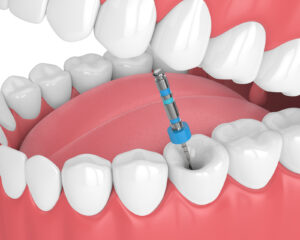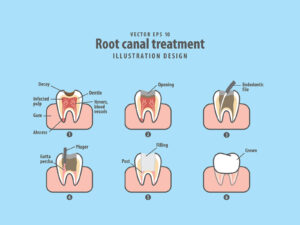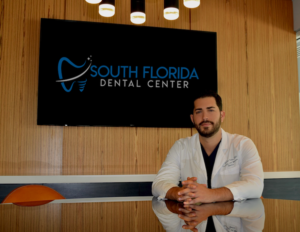Only a dental professional can determine if you need a root canal, but there are 5 signs you need a root canal to look out for. If there’s one thing patients do not want to hear during their dentist appointment, they need a root canal. But while it may be the most dreaded procedure, only a small percentage of patients describe it as their most painful experience.
More than 15 million root canals are performed yearly, and Dr. Daniel Cohen, a leading cosmetic and general dentist in Coral Springs, South Florida, provides many of them to his patients. With years of experience performing root canals in Coral Springs, you can count on Dr. Cohen to provide the best treatment possible.
What Is A Root Canal?

A root canal is a procedure a patient needs to save a tooth from an infection. Basically, Dr. Cohen will remove tooth decay and infected pulp from the tooth while cleaning the root and nerve and sealing the area to prevent new decay. This procedure preserves your natural tooth to prevent the need for extraction.
Signs You Need A Root Canal
Symptoms of a root canal can vary from patient to patient and depend on the type of bacteria in the infection.
- Pain
One of the most significant signs you need a root canal treatment is pain. This pain is persistent; you will likely feel it deep in the bone. The pain can also be present in your face, jaw, and other teeth. This is known as referred pain.
Of course, tooth pain can also be a sign of different problems, some of which are easier to treat, like cavities, gum disease, broken filling, or a sinus infection.
In addition, you could experience pain when you eat or touch the tooth in any way, including when you brush. The decay in your tooth may be causing nerve damage, which will make your tooth more sensitive and more painful.
- Sensitivity
Speaking of sensitivity, it’s the next sign you need a root canal. Because the decay in your tooth is damaging the nerve and blood vessels, you may feel a dull ache or sharp pain whenever you eat and drink hot or cold items. Now, sensitive teeth are common, and you can find relief by using special toothpaste. But the kind of sensitivity that comes with a root canal is different. If you feel persistent pain and sensitivity that does not feel normal, seek immediate care.
- Swollen Gums
Another one of the signs you need a root canal is swollen gums. Infection and tooth decay can result in the tissue surrounding the tooth becoming inflamed and painful to touch. The cause of this swelling is the acidic waste that the dead pulp produces. The swelling can come and go, but it’s a sign that should be taken seriously.
You might also notice what looks like a small pimple on your gums. That abscess may ooze pus and make your breath smell bad. If you notice an abscess on your gums in addition to pain and sensitivity, it’s time to see Dr. Cohen at South Florida Dental Center in Coral Springs.
- Damaged or Loose Tooth
A root canal infection can result from tooth damage you neglect to seek treatment for. You may have had a car accident or other impact that cracked or chipped a tooth. This damage exposes your tooth under the enamel, giving access to bacteria that cause tooth decay and infection. That’s why it’s important to seek treatment immediately to fix the problem before it worsens.
Furthermore, a root canal infection can loosen your tooth because the decay has softened the surrounding bone.
- Tooth Discoloration
If you notice your tooth turning grey or black, it’s a sign that the infection and decay have cut off the blood supply. Tooth discolouration doesn’t automatically mean you need a root canal, but it’s concerning enough to warrant a visit to your dentist. If you are experiencing other signs, such as pain, sensitivity, and swollen gums, you should prepare to hear that you need a root canal.
What To Expect During The Procedure?

Dr. Cohen will obtain images of your tooth, underlying root, and tissue. He will then administer a local anaesthetic to numb the area so you won’t feel pain. A dental dam will protect the area from saliva and bacteria to keep it clean while Dr. Cohen performs the procedure.
A tiny hole is made in the crown of your tooth that allows Dr. Cohen to use very small tools to clean out the dead pulp and infected tissue. After cleaning and preparing the space for filling, a special rubber material known as gutta-percha and adhesive cement fill and seal the canal.
If the root canal fails, you will likely require an apicoectomy, in which Dr Cohen will remove the tip of the tooth root and any further decay or infected tissue before sealing it off so the bone can heal properly.
Many patients usually opt for a dental crown to protect their teeth during healing.
Preventing The Need For A Root Canal
Preventing the need for a root canal is as easy as simply brushing and flossing your teeth regularly and seeing your dentist for a checkup and cleaning at least once a year. Using toothpaste or mouthwash with fluoride can also help strengthen your tooth enamel.
Try also to reduce your consumption of sugary foods and drinks that can cause cavities, or at the very least, clean your teeth after consuming them. Most importantly, do not wait to seek care if you notice any of the abovementioned signs. You may not necessarily need a root canal, but waiting too long to address the cause of your symptoms could mean you will need one later.
Frequently Asked Questions About Root Canals
1. What are the most common signs you need a root canal?
The most common signs include persistent tooth pain, sensitivity to hot or cold foods, swollen or tender gums, tooth discoloration, and a damaged or loose tooth. If you notice one or more of these symptoms, you may need a root canal to save your tooth. Visit Dr. Daniel Cohen in Coral Springs for an accurate diagnosis and treatment.
2. Is getting a root canal painful or uncomfortable?
Many patients worry about pain, but thanks to modern dental technology and local anesthesia, a root canal feels similar to getting a cavity filled. Most discomfort comes from the infection itself, not the procedure. At South Florida Dental Center, Dr. Cohen ensures your root canal is as painless and stress-free as possible.
3. How much does a root canal cost in Coral Springs, Florida?
The cost of a root canal in Coral Springs can vary depending on the tooth involved and whether a dental crown is needed afterward. Front teeth are usually less expensive to treat than molars.
4. How long does it take to recover after a root canal treatment?
Most patients return to normal activities the same day or the next day after their root canal. Some mild soreness or sensitivity is normal for a few days, but it can be managed with over-the-counter pain relievers. Dr. Cohen may recommend a dental crown to protect your tooth and speed up long-term healing.
5. Can a root canal save my tooth instead of pulling it?
Yes! The purpose of a root canal is to save your natural tooth by removing infected tissue and sealing it to prevent further decay. Extracting a tooth should always be the last resort. A root canal preserves your smile, maintains proper chewing function, and prevents future dental problems.
6. How long does a root canal procedure take at the dentist?
A typical root canal takes about 60–90 minutes. More complex cases may require two visits. Dr. Cohen uses advanced techniques and technology to complete most root canal treatments efficiently and comfortably in Coral Springs.
7. How can I avoid needing a root canal in the future?
Prevention is key. Brushing twice a day with fluoride toothpaste, flossing daily, and visiting your dentist regularly for cleanings can greatly reduce your risk of infection. Limiting sugary foods and drinks also helps. If you chip or crack a tooth, seek treatment right away to prevent bacteria from entering and causing decay.
Contact South Florida Dental Center Today!

No one wants to be told they need a root canal, but if you do need one, Dr Daniel Cohen has the skill and experience you need to get the job done right. To make an appointment, call our Coral Springs office at 954-755-7971 today! We proudly serve South Florida and surrounding communities.

